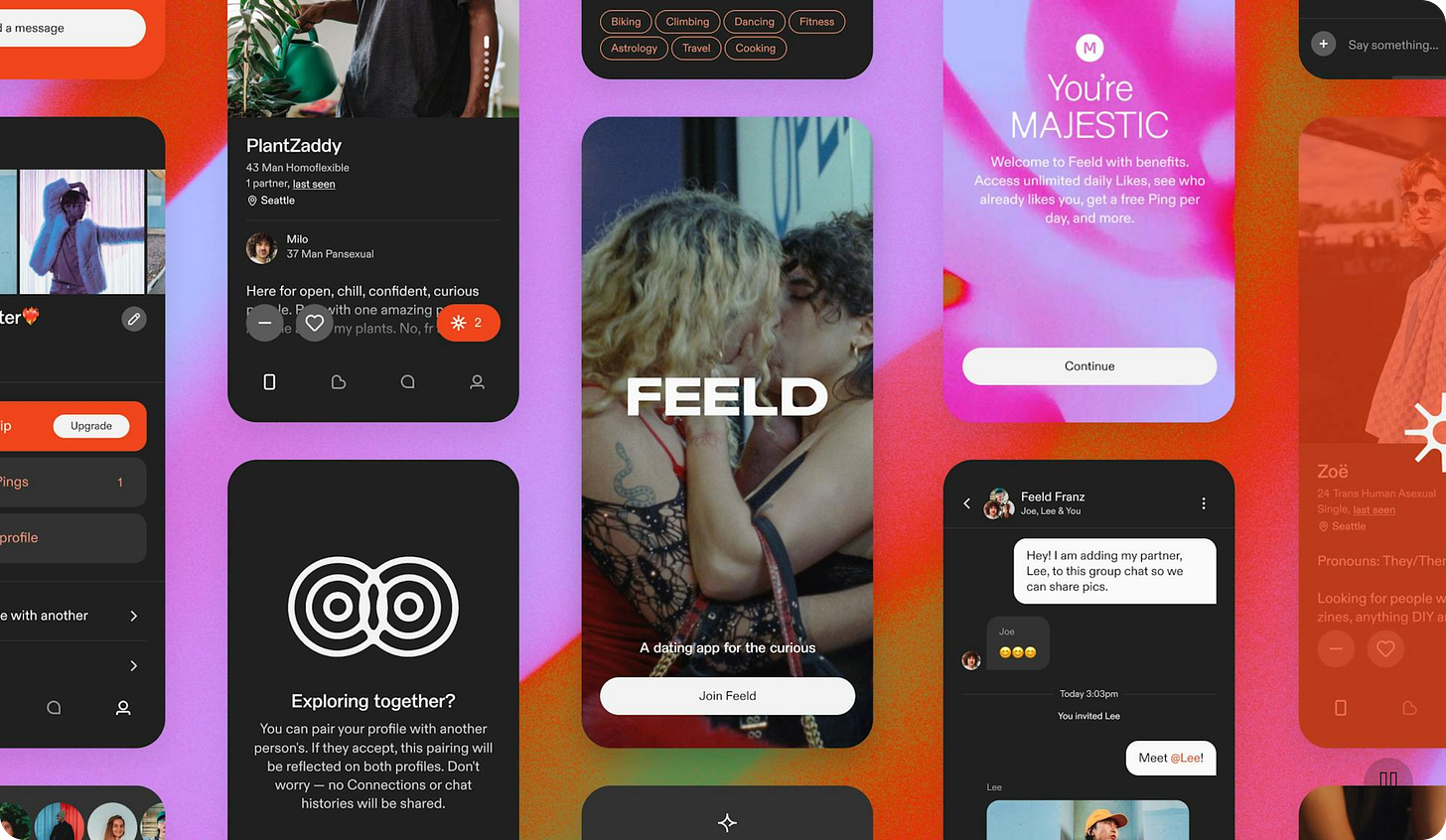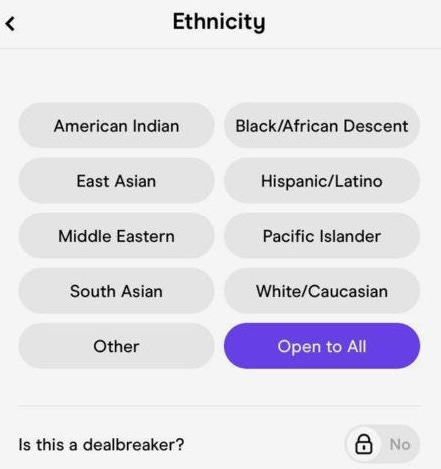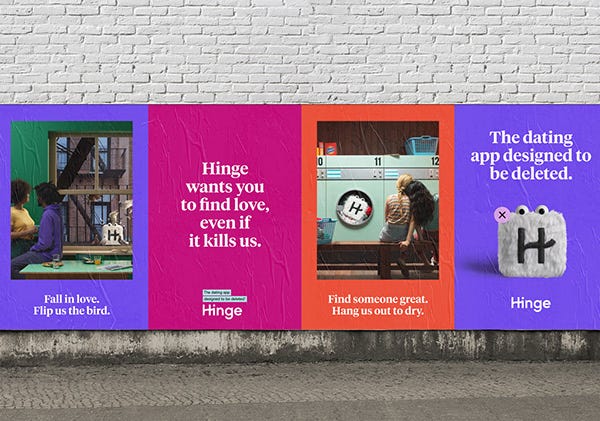#36: Feeld series, finding 'the one' isn't really the point
Welcome to the third installment in my Feeld series! If you're just tuning in, I kicked things off with a glossary of terms, followed by last week's post about the dynamics of four-way dating. Next week, post a "Feeld Diaries,” an hour-by-hour chronicle of preparing for and going on a Feeld date.
Today I’m writing about dating app philosophy. Specifically, how non-monogamous platforms like Feeld operate on completely different principles than monogamous ones.
I’ve been out of the mono-dating game for a minute, but as I understand it the dating app du jour for the under ~50, monogamous crowd is Hinge. I remember seeing subway and billboard ads for the app with their taglines “the dating app designed to be deleted” and “Hinge wants you to find love, even if it kills us.” I think it’s totally good marketing btw, but it made me think about what the Feeld equivalent might be. Maybe "designed to be kept and regularly enjoyed" or “built for browsing, not deleting” or how about "find someone for deep conversations, someone else for traveling the world with, and another person for kink exploration— all without implying any deficiency in your existing relationships." Their actual tagline is “the dating app for open-minded individuals”. These simple marketing taglines show the huge philosophical gap between mono-normative dating apps and their non-monogamous counterparts.
The apps reinforce the different approaches to relationships on a fundamental level. People using apps like Hinge and Bumble generally, at least in theory, want to find one perfect match and then delete the app, whereas users of Feeld are looking for different ongoing connections. Here’s where I put the disclaimer that I’m not saying one approach is better than the other, but just that they're built on completely different premises on what relationships are meant to provide in our lives. This is part of the motivating force behind me writing this newsletter—realizing that explaining non-monogamy to monogamous friends is so challenging because we’re working from completely different relationship operating systems.
The mono apps are designed around a scarcity mindset that says there’s one perfect match out there for you and once you find them you’ve accomplished your mission. The metric of success is about ending the search. I know how exhausting many people find this search process, so for monogamous people, more power to them, truly.
On Feeld and other non-monog platforms, success might mean finding multiple meaningful connections, a casual ongoing arrangement, or maybe just finding other people to talk about things like decentering romance or how it sucks that you can't get health insurance through your partner's employer unless you're legally married, forcing many people into an institution they might otherwise approach more thoughtfully or avoid altogether. Yeah… On Feeld, success could be maintaining a profile for years while continuing to meet new people, all the while nurturing your existing relationships.
I’d compare it to the difference between a traveler who finds their one perfect destination to retire in and just stays there versus someone who has a constantly evolving bucket list of places they want to experience. Neither approach is wrong. They’re just different philosophies about what makes a fulfilling life.
Mono-normative apps, just like society at large, push people toward the relationship escalator. Dating → exclusivity → cohabitation → marriage → kids. The escalator provides clarity and structure that many people genuinely want and appreciate. Non-monogamous apps don’t really have this predetermined path.
We’re more used to having friendships that last for short periods during specific life phases and then naturally fade away. You don’t necessarily assume that all friends will move up a ladder of friendship intensity where you do things like move in together or share finances. Different connections serve different purposes, and we see that as healthy and fine. Non-monogamous dating applies this same philosophy to romantic and sexual connections, and I think this is the point that confounds a lot of monogamists.

The vocabularies of these different dating worlds might as well be different languages too. Here’s a brief translation guide.
"I'm looking for something serious" (Mono apps): I want to find one partner to build a life with exclusively.
"I'm looking for something serious" (Feeld): I want meaningful, emotionally invested connections which might include multiple partners.
"Let's see where this goes" (Mono apps): I’m open to being in a relationship but I have to play it cool and not seem too eager.
"Let's see where this goes" (Feeld): I don’t have any predetermined expectations and I’m open to letting this relationship find its natural level.
"Just looking for fun" (Mono apps): I’m looking for casual encounters with no commitment and might lovebomb you and lead you to believe I want more because you’d otherwise pay me no mind.
"Just looking for fun" (Feeld): I'm seeking playful connections without the expectation of romantic involvement, and because there’s already a culture of this on the app you will take this at face value.
You see me struggling to use neutral language here, but I’m mostly against certain aspects of toxic monogamous culture and not monogamy itself. I think this communication gap leads to so much confusion when people cross over onto the other side. One of my friends went from trying mostly Bumble, Hinge, and Tinder to trying Feeld and was surprised when people were upfront about having partners and wanting casual sex. Feeld is the buggiest app and it’s really frustrating to use at times but people always say it’s this refreshing culture of transparency and lack of judgment that keeps them on it.
One of the most interesting differences I encounter is how these viewpoints treat the temporality of relationships. There’s a general assumption in mono-normative dating culture that a relationship only has value if it lasts forever which, given divorce rates, is already an interesting premise. I absolutely think there’s wisdom in commitment and building something long lasting, but it can also create some challenging pressures.
Some people think a relationship that isn’t heading toward forever is a waste of time or a failure, and I think this creates a pressure to either force compatibility or consider the connection worthless. It’s a binary where relationships are either heading toward forever or seen as distractions. I’ve referenced before a guy I was seeing who thought we had an amazing connection but ultimately saw me as a distraction from his goal of finding a wife. Actually this has been a recurring theme when I date monogamous people.
In my life I prefer to embrace the idea that relationships can be valuable and have a transformative, meaningful impact on your life even if they’re temporary, something I’ve believed since I was a teenager and first coming into my non-monogamous orientation. A connection that lasts for six beautiful months and then naturally ends isn't a failure. It might’ve just been exactly what we both needed at the time.
Think about the different phases of your life and the people central to each one, like the roommates who helped you navigate young adulthood, and the mentor who guided you through a difficult transition, or the bartender at your regular spot you’d shoot the shit with every week. There’s intrinsic value to these relationships, and they don’t need to be permanent to be meaningful. This point I don’t think I really need to harp on because most people I speak to also appreciate how their exes have shaped them, even if they weren’t ‘the one.’ I think it’s just about a subtle difference in framing. Monogamous people see these relationships as steps toward finding their person, while non-monogamous people see each relationship as complete in itself. I don’t necessarily believe one view is more evolved than the other, just different.
I did some research but haven’t used the mono apps in years, so let me know if I’m mistaken, but the technical features of these apps reveal their philosophical differences:
Mono apps feature:
One-to-one messaging only
Heavy emphasis on compatibility for lifelong partnership
Success stories focused on marriages and babies
"Deal-breaker" filters to immediately eliminate potential matches
Feeld offers:
Group chat functionality for multiple connections
Options to link profiles with partners
Focus on desires and boundaries rather than future plans
Emphasis on exploration rather than elimination
Based on what I’ve read and heard, a lot of people on mono apps treat non-monogamy as a deal-breaker filter, which makes sense for them! I appreciate that Feeld recognizes the specific gradations and nuances within open relationship styles and offers a vast array of ways to identify and express what you're seeking.

While evidently I have a bias, I genuinely believe there’s wisdom to be shared in both directions.
What mono dating could learn from non-mono spaces:
How to be more direct and transparent in communicating desires and boundaries
See the intrinsic value and meaning behind connections even if they're not forever
Put less emphasis on finding a person who meets every single need
Be honest about one’s intentions and current circumstances
Less judgment
What non-mono apps could learn from mainstream ones:
Better user interface. Like I said, Feeld is buggyyyy
Better safety and verification features
Make it easier for newbies still learning the vocabulary
More diverse representation in marketing
I suspect we'll eventually see the two different philosophies converging in many ways. The mainstream apps are already adding more features that recognize relationship diversity, and non-monogamous ones are catching up with better matching algorithms and safety/verification features.
The most forward thinking dating apps will recognize that human connection exists on a spectrum more complex than the binary of casual hookup versus find a spouse. If we’re lucky maybe one day we'll even get an app that does it all but without the glitches.
With this post I’m comparing these different approaches not to tell you which is better, but to broaden our ideas around what's possible. I've found freedom in the non-monogamous framework, but whatever relationship structure works best for someone should be something they chose consciously rather than just defaulting to it.






